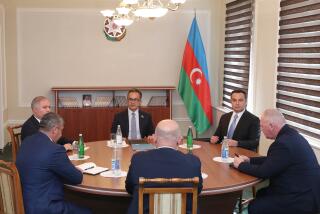Pushtun Leaders Hold Talks on Peaceful Surrender of Kandahar
- Share via
QUETTA, Pakistan — A senior member of the Taliban government consulted with Afghan community leaders here Saturday in what was described as part of a broad-based initiative to negotiate the surrender of the Taliban’s spiritual capital of Kandahar.
The Taliban representative, who declined to be identified by name, was interviewed shortly after his arrival from Afghanistan at the home of a prominent Afghan in Quetta.
He said efforts to surrender the city without a fight had been launched at a secret meeting Monday in the southern Afghan province of Helmand. About 65 prominent Pushtun figures--including Soviet-era commanders, southern tribal elders and more than 20 disillusioned Taliban members--attended the session, he said.
The official said the participants had decided that it was time to surrender the city because the entire Taliban movement had been taken over by a series of corrosive outside forces--the international drug mafia, international terrorists, the puritanical Wahhabi school of Sunni Islam and Pakistan intelligence.
“These four groups hijacked our movement,” said the official, whose anonymity was required because he is still a member of the Taliban government. He also said he would be detained by Pakistani authorities if his mission were known.
Evidence of a stepped-up search for a negotiated end to Taliban rule in Afghanistan’s second-largest city came amid reports that forces operating under two ethnic Pushtun tribal chiefs had launched an offensive against Taliban units between Kandahar and the southern border town of Spin Buldak.
Hundreds of fighters loyal to influential southern tribal chief Hamid Karzai and another force under a former Soviet-era commander and tribal leader, Gul Agha Shirzai, were engaged in heavy fighting against Taliban forces along the main road that connects Kandahar with its southern hinterland, Karzai’s brother, Ahmed, said early Saturday.
Late Saturday evening, a spokesman for Shirzai’s forces said fighting continued.
“Sometimes the Taliban say, ‘Let’s talk,’ then they change their minds,” said the spokesman, Abdul Qayum Jan.
The attack marked the first significant ground action against the Taliban anywhere close to Kandahar, one of the movement’s last major strongholds as well as home to its leader, Mullah Mohammed Omar.
The offensive and the negotiations for the city’s peaceful hand-over are further indications that the Taliban’s rule of Afghanistan seems to be entering its final phase.
Two days after the Helmand meeting, Omar’s spokesman, Taib Agha, insisted during a news conference with foreign journalists in Spin Buldak that no negotiations were underway for the city’s surrender. Agha and Omar lead the Taliban’s hard-line faction that rejects any contacts that might lead to a surrender.
According to Afghan community leaders in Quetta aware of the process, the group discussed how and why the Taliban movement had failed in its political goal of turning Afghanistan into a pure Islamic state and lost public support for its cause.
“They’ve come to understand Mullah Omar has no power, no say,” said Mehmood Khan Achakzai, who heads a Pushtun nationalist political party in Quetta, the Pushtun-kwa. “They felt they had to do something.”
The meeting is said to have included representatives of Sibghatullah Mojaddidi, Afghanistan’s first post-Soviet president and a strong supporter of Afghanistan’s former king, Mohammad Zaher Shah. However, other important figures in the area, including Hamid Karzai and Shirzai, were not represented.
After a day of discussions, the group reportedly agreed to canvass tribal opinion, both in Afghanistan’s southern provinces and in the large Afghan refugee community in and around Quetta, before reconvening to draft a plan that would transfer political power temporarily to a group of tribal elders and other prominent figures called a shura.
Achakzai said the group also favored convening a similar, national-level council called a loya jirga for creation of a successor national government with an undetermined role for Zaher Shah.
There are considerable risks involved in working toward such a solution from inside Afghanistan as long as the Taliban retains some control. There were reports Saturday that Taliban forces killed seven people and arrested more than 20 others when they broke up a meeting of tribal elders, also in Helmand province, after discovering that the elders were advocating the return of the former king.
Those aware of the political process said the current effort was being undertaken in hopes of avoiding a power vacuum from the Taliban collapse and a possible slide into anarchy, in which various warlords and their fighters would battle among themselves for control of parts of the city and surrounding areas. It was exactly such a chaotic situation that led people initially to embrace the Taliban, because it restored a degree of order.
“My biggest fear is warlordism,” Ahmed Karzai said.
Many of those watching events unfold in Quetta believe that a successful negotiated surrender of Kandahar depends heavily on the outcome of a surrender reportedly underway in the northern city of Kunduz. If the Taliban’s Afghan and foreign fighters are treated humanely by Northern Alliance forces after giving up, it could encourage those in Kandahar to seek some kind of similar peaceful hand-over of power.
Any reports of massacres or ill treatment would likely strengthen the hand of Taliban hard-liners in Kandahar who want to fight rather than surrender peacefully. This group is said to include Omar and most of the Arab, Pakistani and Chechen fighters in the city. Ahmed Karzai also claimed that three of Omar’s most reliable commanders are believed to be in Kunduz. He said their surrender would likely further weaken Omar’s control over the movement.
More to Read
Sign up for Essential California
The most important California stories and recommendations in your inbox every morning.
You may occasionally receive promotional content from the Los Angeles Times.













